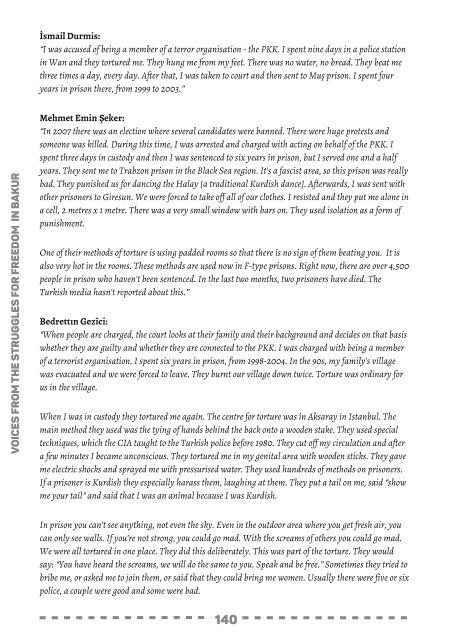STRUGGLES
Struggles-for-autonomy-in-Kurdistan
Struggles-for-autonomy-in-Kurdistan
Create successful ePaper yourself
Turn your PDF publications into a flip-book with our unique Google optimized e-Paper software.
İsmail Durmis:<br />
“I was accused ofbeing a member ofa terror organisation - the PKK. I spent nine days in a police station<br />
in Wan and they tortured me. They hung me from my feet. There was no water, no bread. They beat me<br />
three times a day, every day. After that, I was taken to court and then sent to Muş prison. I spent four<br />
years in prison there, from 1999 to 2003.”<br />
voices from the struggles for freedom in bakur<br />
Mehmet Emin Şeker:<br />
“In 2007 there was an election where several candidates were banned. There were huge protests and<br />
someone was killed. During this time, I was arrested and charged with acting on behalfofthe PKK. I<br />
spent three days in custody and then I was sentenced to six years in prison, but I served one and a half<br />
years. They sent me to Trabzon prison in the Black Sea region. It's a fascist area, so this prison was really<br />
bad. They punished us for dancing the Halay [a traditional Kurdish dance]. Afterwards, I was sent with<br />
other prisoners to Giresun. We were forced to take offall ofour clothes. I resisted and they put me alone in<br />
a cell, 2 metres x 1 metre. There was a very small window with bars on. They used isolation as a form of<br />
punishment.<br />
One oftheir methods oftorture is using padded rooms so that there is no sign ofthem beating you. It is<br />
also very hot in the rooms. These methods are used now in F-type prisons. Right now, there are over 4,500<br />
people in prison who haven't been sentenced. In the last two months, two prisoners have died. The<br />
Turkish media hasn't reported about this.”<br />
Bedrettın Gezîci:<br />
“When people are charged, the court looks at their family and their background and decides on that basis<br />
whether they are guilty and whether they are connected to the PKK. I was charged with being a member<br />
ofa terrorist organisation. I spent six years in prison, from 1998-2004. In the 90s, my family's village<br />
was evacuated and we were forced to leave. They burnt our village down twice. Torture was ordinary for<br />
us in the village.<br />
When I was in custody they tortured me again. The centre for torture was in Aksaray in Istanbul. The<br />
main method they used was the tying ofhands behind the back onto a wooden stake. They used special<br />
techniques, which the CIA taught to the Turkish police before 1980. They cut offmy circulation and after<br />
a few minutes I became unconscious. They tortured me in my genital area with wooden sticks. They gave<br />
me electric shocks and sprayed me with pressurised water. They used hundreds ofmethods on prisoners.<br />
Ifa prisoner is Kurdish they especially harass them, laughing at them. They put a tail on me, said “show<br />
me your tail”and said that I was an animal because I was Kurdish.<br />
In prison you can’t see anything, not even the sky. Even in the outdoor area where you get fresh air, you<br />
can only see walls. Ifyou’re not strong, you could go mad. With the screams ofothers you could go mad.<br />
We were all tortured in one place. They did this deliberately. This was part ofthe torture. They would<br />
say: “You have heard the screams, we will do the same to you. Speak and be free.”Sometimes they tried to<br />
bribe me, or asked me to join them, or said that they could bring me women. Usually there were five or six<br />
police, a couple were good and some were bad.<br />
140


